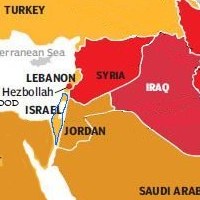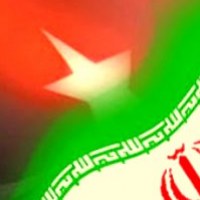![]()
Thu, June 20,2013 | RubinReports | By Barry Rubin
Let’s say that you feel Iran is the bigger of the two evils and that Tehran, Hizballah, and Russia cannot be allowed to have a victory in the Syrian civil war. Therefore, the United States has to supply weapons to the rebels despite the fact that they are America-hating Islamists. I can understand that argument but let’s explore the adventure that the United States and European Union is about to embark on.
The cost is the U.S. backing for the Sunni Islamist takeover of much of the Middle East. The benefit is….denying Syria to Iranian influence after 30 years. Of course, it won’t be under U.S. influence. And many wars may flow from this policy: A Sunni Islamist regime’s war on Israel, Hizballah in Lebanon, the Syrian Kurds, and possibly Iraq (Sunni versus Shia) and Jordan (Islamist subversion to help the Muslim Brotherhood).
If the United States supplies enough weapons to just keep the rebels going, that would be one thing. But American policymakers are likely to be carried away — as often happens to Americans in this situation — and to see rebel victory as the equivalent of good, the heroic freedom fighters battling for the liberation of puritanical Sharia.
It is surprising that it doesn’t seem to bother a lot of people to support an antisemitic, anti-Christian, anti-woman, anti-gay movement that has already committed atrocities, whose leading organization also once collaborated with the Nazis, and about 20 percent of which consists of al-Qaida supporters?
Also we have just seen the proliferation of weapons and terrorists following the U.S.-sponsored support of Islamists after the Iraq, Libya, and Afghanistan wars.
Moreover, don’t count the rebels out yet despite the hysteria that Assad is winning. Five weeks ago everyone claimed the rebels were winning. Moreover, while I don’t want the Syrian regime to win, let’s remember that two short years ago the Obama Administration was courting Syria as a potential ally, treating what was still a dreaded dictatorship as if it was one step from singing, “Yankee Doodle Dandy.” Visiting U.S. officials and members of Congress became apologists for the regime. For those remembering these events, the current scene is disgusting. Suddenly Syria became a ferocious dictatorship. It was always a ferocious dictatorship. Suddenly it became an ally of Tehran, a stance that the Obama Administration claimed two short years ago that it was going to reverse. In fact, it has been an ally of Iran for more than 30 years.
How short are memories. Analogies to other recent events are also often ridiculous — World War Two, the Spanish Civil War — made by people who know nothing about Syria. In Iraq, for example, there were viable democratic forces and the United States had real leverage over the situation. While one might want the overthrow of the Assad regime, that just isn’t true in Syria.
In Syria, the United States has not just accepted but backed from the start an exile leadership that not only was dominated by the Muslim Brotherhood but which refuses to even allow a significant representation by liberal moderates and the Kurds! If U.S. policy, soon to be paying the bills and giving the weapons, cannot achieve that then why give help without conditions? Again, one wants the Assad regime to fall but cannot Washington even extract any political price for this support of the rebels? From Turkey to get more support for U.S. policy toward Iran from Ankara? No.
Will the murder of Christians and other rebel atrocities incur any penalties on U.S. backing or not? Everyone should know that the United States cannot protect one Syrian civilian from murder and persecution by the rebels. Who is doing who a favor?
The strategic issues have also not been fully thought out. Iran is not Nazi Germany and it is going to get nuclear weapons no matter what happens in Syria. Its ability to project influence into the Arab world is limited to Lebanon — where the United States has always accepted it before — and to a lesser degree to Syria and a bit to Iraq. One can make the case that the Sunni Islamists, without a big source of money or arms, are less threatening than Iran. Yet that depends, too, on how Sunni Islamist policy, which largely means the Muslim Brotherhood, develop. What is needed here are cool-headed evaluations; what we see is bordering on hysteria.
There’s something in the U.S. military culture called “mission creep,” that means the task given the U.S. army is extended far beyond the original intention. Also, in military affairs nothing turns out to be as easy as you expect. If, for example, the rebels can’t win otherwise will there need to be a no-fly zone? Or more intervention? All to produce a likely result of an anti-American terrorist-sponsoring dictatorship? Or perhaps it can be bought off for a while by sending billions of dollars of aid to subsidize a Muslim Brotherhood dictatorship. Already we see the war hysteria building.
So let’s say that Obama sets a policy of sending only limited numbers of light weapons to moderate forces. Naturally, though, the U.S. trainers will not be able to vet every trainee. We know that’s true and there will no doubt be terrorist-minded and extremist soldiers whose skills will increase thanks to Uncle Sam. Many of them are young. Perhaps some of them won ‘t retire after the Syrian civil war ends.
But what’s really worrisome is the next step. Suppose the rebels still aren’t winning. The aides and experts and advisers then explain to the White House that unless more and better weapons are sent then “our” side will lose. That can’t happen, right? It will be an even more humiliating loss to the Russians, Iranians, Hizballah, and the Syrian regime that not so long ago — just over two years ago — was Obama’s good buddy.
At that point, there comes escalation: more weapons, more American involvement, better arms. That is going to be a big temptation and who is going to stand up and say, “No.”
Now think of the opposite outcome. The rebels quickly reverse the tide of battle and they are winning. In that case, the officials say, “Just a little more aid and we can have a big victory.” Once again, mission creep.
And what would the U.S. government do if and when the rebels start murdering civilians. Imagine, there are people who don’t support Israel and want the United States to reduce help because it is “immoral” doing certain things. But they are going to accept rebels cutting off the heads of people, wiping out dozens of civilians, shooting prisoners, and even eating a few body parts of murdered Syrian prisoners?
All of these things have already happened and will happen more. And, here’s the big thing, the United States will have no leverage to affect this behavior. The leaders are not in control; the rebels don’t want to do America’s bidding. Will the aid be cut off at that point? No. Too many reputations will be on the line; too much political capital will have been extended.
Meanwhile the Sunni Muslim side and particularly the Sunni Islamist side will urge the United States on, promising it anything if it puts their friends in power. Obama will believe that the Arabs love America and will support U.S. interests. Until, of course, the day after they take over — or say several months afterward — when the Muslim Brotherhood turns on America and the Salafists attack Israel.
There is, however, one possible way out: if the United States can say Iran made us do it by escalating its own involvement in the war. There is something peculiar happening after the Iranian presidential election. On one hand, the media throughout the West is proclaiming that Iran is now moderate, forgetting that the same thing (the election of a relatively moderate president 16 years ago) without changing anything. On the other hand, though, Iran seems to have become more aggressive and threatening after the election. The Iranian supreme guide directly insulted Obama, saying he was a puppet of Zionist interests and was only elected in a phony process, unlike the freedom enjoyed in Iran. The point is that Iran may have overplayed its hand, throwing away a wonderful opportunity to fool the West and get sanctions reduced while still building nuclear weapons.
At any rate, this is a big mess and it will not turn out well.
Speaking of big messes, to consolidate the Obama Doctrine — allying or engaging with Sunni Islamist extremists — the United States is now entering public negotiations with the Taliban. The Afghan Taliban, you might remember, was a partner in the September 11, 2001, attacks and has been unrepentant. The supposed price will be that the Taliban, which is killing Americans on a daily basis in Afghanistan, may merely renounce al-Qaida. But since al-Qaida doesn’t exist any more in Afghanistan this is hardly significant. Mere words from the no-doubt-trustworthy Taliban — or will even an apology be required — will make up for the murder of around 3000 Americans. According to U.S. policy, there is a radical and moderate wing of the Syrian rebels, the Egyptian Muslim Brotherhood regime, the Turkish stealth Islamist regime, probably now the Iranian regime, and several others as well no doubt.
The Taliban has been calling the Afghan government an American puppet and the Afghan government reacted to news of the talks angrily, with a feeling of betrayal, and broke off its own talks with the United States. Sound like a pattern? The U.S. government siding with enemies and subverting historical allies?
Oh, and four American soldiers were killed by a Taliban attack the same day as these diplomatic developments happened.
Finally, the new Iranian president has been declared a moderate by much of the Western establishment. First, it is assumed he is a moderate. True, he was the person out of desperation who was supported by the opposition but he has a long record as a key national security official who does not differ from the main political line. Second, he is powerless because the supreme guide is in charge.
Imagine a “Cold War” in which the United States would have taken the Communist side and you get a picture of current U.S. policy.
Barry Rubin is director of the Global Research in International Affairs (GLORIA) Center and editor of the Middle East Review of International Affairs (MERIA) Journal. His next book, Nazis, Islamists and the Making of the Modern Middle East, written with Wolfgang G. Schwanitz, will be published by Yale University Press in January 2014. His latest book is “Israel: An Introduction“, also published by Yale. Thirteen of his books can be read and downloaded for free at the website of the GLORIA Center including “The Arab States and the Palestine Conflict”, “The Long War for Freedom: The Arab Struggle for Democracy in the Middle East” and “The Truth About Syria”. His blog is Rubin Reports. His original articles are published at PJMedia.



 RSS
RSS











Latest Comments
Hello Mike, Thank you for your positive feedback to the article. I felt there wasn’t too much critical analysis of ...
Thanks for this considered and well constructed article. A follow up article on the manner in which the editorial contro...
THE CLUELESSNESS OF CLAIMING THAT OBAMA'S MIDDLE EAST POLICIES WERE A FAILURE CANNOT BE FURTHER FROM THE TRUTH, WHAT THE...
As long as Obama is the president of the usa do not trust the us government......
Thank you for an good read....